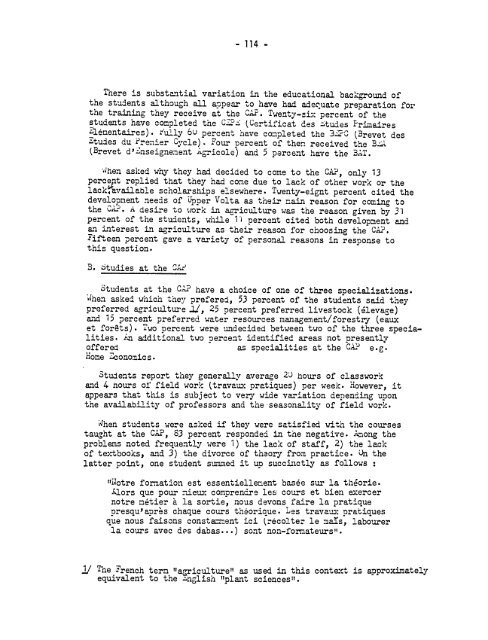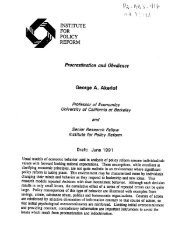Bi.,5 - (PDF, 101 mb) - USAID
Bi.,5 - (PDF, 101 mb) - USAID
Bi.,5 - (PDF, 101 mb) - USAID
- TAGS
- usaid
- pdf.usaid.gov
You also want an ePaper? Increase the reach of your titles
YUMPU automatically turns print PDFs into web optimized ePapers that Google loves.
- 114 -<br />
There is substantial variation in the educational background of<br />
the students although all appear to have had adequate preparation for<br />
the training they receive at the CA. Twenty-six percent of the<br />
students have completed the C01 (Certificat des Studes Primaires<br />
-mentaires). rublly 6u percent have completed the 30C (Brevet des<br />
Etudes du Premier Cycle). Four percent of them received the B.IA<br />
(Brevet d'Enseignement Agricole) and 5 percent have the BAT.<br />
When asked why they had decided to come to the CAP, only 13<br />
percent replied that they had come due to lack of other work or the<br />
lackvailable scholarships elsewhere. Twenty-eignt percent cited the<br />
development needs of Upper Volta as their main reason for coming to<br />
the CA?. A desire to work in agriculture was the reason given by 31<br />
percent of the students, while 11 percent cited both development and<br />
an interest in agriculture as their reason for choosing the CAP.<br />
Fifteen percent gave a variety of personal reasons in response to<br />
this question.<br />
B. 6tudies at the CA?<br />
Students at the CAP have a choice of one of three specializations.<br />
When asked which they prefered, 53 percent of the students said they<br />
preferred agriculture .d, 25 percent preferred livestock (41evage)<br />
and 15 percent preferred water resources management/forestry (eaux<br />
et forts). Two percent were undecided between two of the three specialities.<br />
An additional two percent identified areas not presently<br />
offered as specialities at the CA? e.g.<br />
Home Zconomics.<br />
Students report they generally average 2 hours of classwork<br />
and 4 hours of field work (travaux pratiques) per week. However, it<br />
appears that this is subject to very wide variation depending upon<br />
the availability of professors and the seasonality of field work.<br />
When students were asked if they were satisfied with the courses<br />
taught at the CAP, 83 percent responded in the negative. Among the<br />
problems noted frequently were 1) the lack of staff, 2) the lack<br />
of textbooks, and 3) the divorce of theory from practice. n the<br />
latter point, one student summed it up succinctly as follows :<br />
"Notre formation est essentiellement bas6e sur la th~orie.<br />
Alors que pour mieux comprendre les cours et bien exercer<br />
notre metier k la sortie, nous devons faire la pratique<br />
presqu'apr~s chaque cours theorique. Les travaux pratiques<br />
que nous faisons constament ici Irecolter le mals, labourer<br />
la cours avec des dabas...) sont non-formateurs".<br />
_/ The French term "agriculture" as used in this context is approximately<br />
equivalent to the Inglish "plant sciences".

















